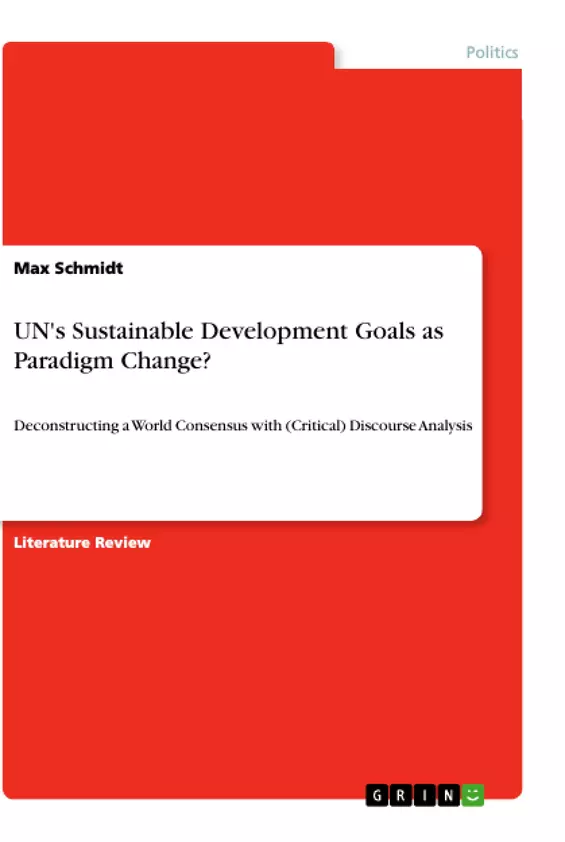This paper strives to provide an overview of the critical academic engagement with the Sustainable Development Goals (SDGs). This literature review is structured as follows: Firstly, a short introduction to the key terms facilitated in this paper will be given: 'development' and its distinction to 'sustainable development'. Secondly, the underlying methodology of critical discourse analysis (CDA) and its differentiation from discourse analysis (DA) will be presented in order to embed the subsequent overview. Finally, some main findings will be compared with the contribution of (C)DA to development studies.
In late 2015, one of the most far-reaching consensuses in the world was unanimously agreed upon by the 193 countries of the United Nations (UN) General Assembly: the Sustainable Development Goals (SDGs). Set out to fulfil ambitious development targets by 2030, ranging from the complete eradication of poverty in all its forms everywhere (Goal 1) to strengthening the Global Partnership for Sustainable Development (SD) (Goal 17), this framework is part of the so-called Post-2015 Development Agenda respectively '2030 Agenda' (eponymous by the main document constituting the SDGs passed by the UN in 2015).
As the intended outcome of this process, which was initiated in 2012, the SDGs are the legitimate successor of the Millenium Development Goals (MDGs), a set of eight goals that were promised to be reached by 2015 by the UN Millenium Declaration (passed in 2000). Facing manifold shortcomings of the MDGs, which were measured by a mere 18 targets, the SDGs were extended to 17 goals measured by 169 targets.
Unsurprisingly and especially regarding their abundance, the SDGs faced harsh critique from most diverse commentators. In one of its issues in March 2015, the internationally renowned weekly newspaper The Economist, for example, portrayed the SDGs as even worse than useless. Due to their presumably bloated nature as a “myriad of top-down targets“ (The Economist 2015), they would not only distract from poverty eradication as the potentially most important goal but also overlook the importance of local contexts, ultimately resulting in “cookie-cutter development policies” (Ibid.). However, the majority of publication organs and stakeholders in the international development community did not articulate an equally harsh (and narrow) critique, as the goals of the SDGs seem difficult to contradict - at least on first glance.
Inhaltsverzeichnis (Table of Contents)
- Introduction
- Theoretical framework
- Methodological framework
- The status quo
- Conclusion
- References
- Appendix
Zielsetzung und Themenschwerpunkte (Objectives and Key Themes)
This literature review aims to explore the critical academic engagement with the Sustainable Development Goals (SDGs). It provides an overview of the discourse surrounding these goals and their implications for development studies. The review uses critical discourse analysis (CDA) to analyze the ways in which the SDGs are represented and interpreted within the development discourse.
- The evolution and depoliticization of the concept of development.
- The meaning and contested nature of sustainable development (SD).
- The role of discourse analysis in understanding global development goals.
- The application of critical discourse analysis to the SDGs.
- The potential for discourse analysis to contribute to the field of development studies.
Zusammenfassung der Kapitel (Chapter Summaries)
- Introduction: This chapter provides an overview of the SDGs and their historical context, highlighting the goals' ambitious scope and the potential for paradigm change in development approaches. The chapter also introduces the critical discourse analysis framework used in the review.
- Theoretical framework: This chapter examines the concept of "development" and its evolution, focusing on the depoliticization of the term and its impact on development policy. It then explores the definition of "sustainable development" (SD) and its implications for development practices.
- Methodological framework: This chapter outlines the methodology of critical discourse analysis (CDA) and its distinction from discourse analysis (DA). It also presents the specific approach to CDA used in the review, drawing on the work of various scholars in the field.
Schlüsselwörter (Keywords)
The main keywords and focus topics of this review include sustainable development, sustainable development goals, critical discourse analysis, discourse analysis, development studies, global development, development policy, paradigm change, global governance, and the United Nations.
Frequently Asked Questions
What are the UN Sustainable Development Goals (SDGs)?
The SDGs are a set of 17 goals with 169 targets agreed upon by 193 UN member states in 2015, aimed at eradicating poverty and ensuring sustainability by 2030.
How do the SDGs differ from the Millennium Development Goals (MDGs)?
The SDGs are more comprehensive, expanding from 8 goals (MDGs) to 17, and address a wider range of social, economic, and environmental issues.
What is Critical Discourse Analysis (CDA) in development studies?
CDA is a methodology used to analyze how development concepts are represented in language and how these discourses reflect power structures and policy choices.
What are the main criticisms of the SDGs?
Critics argue they are a "bloated myriad of top-down targets" that may distract from core issues like poverty and overlook local contexts.
Do the SDGs represent a paradigm change in development?
The paper explores whether the shift to "sustainable development" is a genuine change in approach or a depoliticization of traditional development concepts.
- Quote paper
- Max Schmidt (Author), 2019, UN's Sustainable Development Goals as Paradigm Change?, Munich, GRIN Verlag, https://www.grin.com/document/502727



